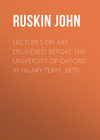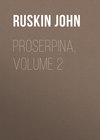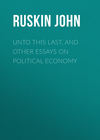Loe raamatut: «Time and Tide by Weare and Tyne», lehekülg 6
LETTER XVI.
OF PUBLIC EDUCATION IRRESPECTIVE OF CLASS-DISTINCTION. IT CONSISTS ESSENTIALLY IN GIVING HABITS OF MERCY, AND HABITS OF TRUTH. (GENTLENESS5 AND JUSTICE.)
March 30th, 1867.
87. Thank you for sending me the pamphlet containing the account of the meeting of clergy and workmen, and of the reasonings which there took place. I cannot promise you that I shall read much of them, for the question to my mind most requiring discussion and explanation is not, why workmen don't go to church, but—why other people do. However, this I know, that if among our many spiritual teachers, there are indeed any who heartily and literally believe that the wisdom they have to teach "is more precious than rubies, and all the things thou canst desire are not to be compared unto her," and if, so believing, they will further dare to affront their congregations by the assertion; and plainly tell them they are not to hunt for rubies or gold any more, at their peril, till they have gained that which cannot be gotten for gold, nor silver weighed for the price thereof,—such believers, so preaching, and refusing to preach otherwise till they are in that attended to, will never want congregations, both of working men, and every other kind of men.
88. Did you ever hear of anything else so ill-named as the phantom called the "Philosopher's Stone"? A talisman that shall turn base metal into precious metal, nature acknowledges not; nor would any but fools seek after it. But a talisman to turn base souls into noble souls, nature has given us! and that is a "Philosopher's Stone" indeed, but it is a stone which the builders refuse.
89. If there were two valleys in California or Australia, with two different kinds of gravel in the bottom of them; and in the one stream bed you could dig up, occasionally and by good fortune, nuggets of gold; and in the other stream bed, certainly and without hazard, you could dig up little caskets, containing talismans which gave length of days and peace; and alabaster vases of precious balms, which were better than the Arabian Dervish's ointment, and made not only the eyes to see, but the mind to know, whatever it would—I wonder in which of the stream beds there would be most diggers?
90. "Time is money"—so say your practised merchants and economists. None of them, however, I fancy, as they draw towards death, find that the reverse is true, and that "money is time"? Perhaps it might be better for them, in the end, if they did not turn so much of their time into money, lest, perchance, they also turn Eternity into it! There are other things, however, which in the same sense are money, or can be changed into it, as well as time. Health is money, wit is money, knowledge is money; and all your health, and wit, and knowledge may be changed for gold; and the happy goal so reached, of a sick, insane, and blind, auriferous old age; but the gold cannot be changed in its turn back into health and wit.
91. "Time is money;" the words tingle in my ears so that I can't go on writing. Is it nothing better, then? If we could thoroughly understand that time was—itself,—would it not be more to the purpose? A thing of which loss or gain was absolute loss, and perfect gain. And that it was expedient also to buy health and knowledge with money, if so purchasable; but not to buy money with them?
And purchasable they are at the beginning of life, though not at its close. Purchasable, always, for others, if not for ourselves. You can buy, and cheaply, life, endless life, according to your Christian's creed—(there's a bargain for you!) but—long years of knowledge, and peace, and power, and happiness of love—these assuredly and irrespectively of any creed or question,—for all those desolate and haggard children about your streets.
92. "That is not political economy, however." Pardon me; the all-comfortable saying, "What he layeth out, it shall be paid him again," is quite literally true in matters of education; no money seed can be sown with so sure and large return at harvest-time as that; only of this money-seed, more than of flesh-seed, it is utterly true, "That which thou sowest is not quickened except it die." You must forget your money, and every other material interest, and educate for education's sake only! or the very good you try to bestow will become venomous, and that and your money will be lost together.
93. And this has been the real cause of failure in our efforts for education hitherto—whether from above or below. There is no honest desire for the thing itself. The cry for it among the lower orders is because they think that, when once they have got it, they must become upper orders. There is a strange notion in the mob's mind now-a-days (including all our popular economists and educators, as we most justly may, under that brief term "mob"), that everybody can be uppermost; or at least, that a state of general scramble, in which everybody in his turn should come to the top, is a proper Utopian constitution; and that, once give every lad a good education, and he cannot but come to ride in his carriage (the methods of supply of coachmen and footmen not being contemplated). And very sternly I say to you—and say from sure knowledge—that a man had better not know how to read and write, than receive education on such terms.
94. The first condition under which it can be given usefully is, that it should be clearly understood to be no means of getting on in the world, but a means of staying pleasantly in your place there. And the first elements of State education should be calculated equally for the advantage of every order of person composing the State. From the lowest to the highest class, every child born in this island should be required by law to receive these general elements of human discipline, and to be baptized—not with a drop of water on its forehead—but in the cloud and sea of heavenly wisdom and of earthly power.
And the elements of this general State education should be briefly these:
95. First—The body must be made as beautiful and perfect in its youth as it can be, wholly irrespective of ulterior purpose. If you mean afterwards to set the creature to business which will degrade its body and shorten its life, first, I should say, simply,—you had better let such business alone;—but if you must have it done, somehow, yet let the living creature, whom you mean to kill, get the full strength of its body first, and taste the joy, and bear the beauty of youth. After that, poison it, if you will. Economically, the arrangement is a wiser one, for it will take longer in the killing than if you began with it younger; and you will get an excess of work out of it which will more than pay for its training.
Therefore, first teach—as I have said in the preface to 'Unto this Last'—"The Laws of Health, and exercises enjoined by them;" and, to this end, your schools must be in fresh country, and amidst fresh air, and have great extents of land attached to them in permanent estate. Riding, running, all the honest, personal exercises of offense and defense, and music, should be the primal heads of this bodily education.
96. Next to these bodily accomplishments, the two great mental graces should be taught, Reverence and Compassion: not that these are in a literal sense to be "taught," for they are innate in every well-born human creature, but they have to be developed exactly as the strength of the body must be, by deliberate and constant exercise. I never understood why Goethe (in the plan of education in 'Wilhelm Meister') says that reverence is not innate, but must be taught from without; it seems to me so fixedly a function of the human spirit, that if men can get nothing else to reverence they will worship a fool, or a stone, or a vegetable.6 But to teach reverence rightly is to attach it to the right persons and things; first, by setting over your youth masters whom they cannot but love and respect; next, by gathering for them, out of past history, whatever has been most worthy in human deeds and human passion; and leading them continually to dwell upon such instances, making this the principal element of emotional excitement to them; and, lastly, by letting them justly feel, as far as may be, the smallness of their own powers and knowledge, as compared with the attainments of others.
97. Compassion, on the other hand, is to be taught chiefly by making it a point of honor, collaterally with courage, and in the same rank (as indeed the complement and evidence of courage), so that, in the code of unwritten school law, it shall be held as shameful to have done a cruel thing as a cowardly one. All infliction of pain on weaker creatures is to be stigmatized as unmanly crime; and every possible opportunity taken to exercise the youths in offices of some practical help, and to acquaint them with the realities of the distress which, in the joyfulness of entering into life, it is so difficult, for those who have not seen home suffering, to conceive.
98. Reverence, then, and compassion, we are to teach primarily, and with these, as the bond and guardian of them, truth of spirit and word, of thought and sight. Truth, earnest and passionate, sought for like a treasure, and kept like a crown.
This teaching of truth as a habit will be the chief work the master has to do; and it will enter into all parts of education. First, you must accustom the children to close accuracy of statement; this both as a principle of honor, and as an accomplishment of language, making them try always who shall speak truest, both as regards the fact he has to relate or express (not concealing or exaggerating), and as regards the precision of the words he expresses it in, thus making truth (which, indeed, it is) the test of perfect language, and giving the intensity of a moral purpose to the study and art of words: then carrying this accuracy into all habits of thought and observation also, so as always to think of things as they truly are, and to see them as they truly are, as far as in us rests. And it does rest much in our power, for all false thoughts and seeings come mainly of our thinking of what we have no business with, and looking for things we want to see, instead of things that ought to be seen.
99. "Do not talk but of what you know; do not think but of what you have materials to think justly upon; and do not look for things only that you like, when there are others to be seen"—this is the lesson to be taught to our youth, and inbred in them; and that mainly by our own example and continence. Never teach a child anything of which you are not yourself sure; and, above all, if you feel anxious to force anything into its mind in tender years, that the virtue of youth and early association may fasten it there, be sure it is no lie which you thus sanctify. There is always more to be taught of absolute, incontrovertible knowledge, open to its capacity, than any child can learn; there is no need to teach it anything doubtful. Better that it should be ignorant of a thousand truths, than have consecrated in its heart a single lie.
100. And for this, as well as for many other reasons, the principal subjects of education, after history, ought to be natural science and mathematics; but with respect to these studies, your schools will require to be divided into three groups: one for children who will probably have to live in cities, one for those who will live in the country, and one for those who will live at sea; the schools for these last, of course, being always placed on the coast. And for children whose life is to be in cities, the subjects of study should be, as far as their disposition will allow of it, mathematics and the arts; for children who are to live in the country, natural history of birds, insects, and plants, together with agriculture taught practically; and for children who are to be seamen, physical geography, astronomy, and the natural history of sea-fish and sea-birds.
101. This, then, being the general course and material of education for all children, observe farther, that in the preface to 'Unto this Last' I said that every child, besides passing through this course, was at school to learn "the calling by which it was to live." And it may perhaps appear to you that after, or even in the early stages of education such as this above described, there are many callings which, however much called to them, the children might not willingly determine to learn or live by. "Probably," you may say, "after they have learned to ride, and fence, and sing, and know birds and flowers, it will be little to their liking to make themselves into tailors, carpenters, shoemakers, blacksmiths, and the like." And I cannot but agree with you as to the exceeding probability of some such reluctance on their part, which will be a very awkward state of things indeed, (since we can by no means get on without tailoring and shoemaking,) and one to be meditated upon very seriously in next letter.
102. P.S.—Thank you for sending me your friend's letter about Gustave Doré; he is wrong, however, in thinking there is any good in those illustrations of 'Elaine.' I had intended to speak of them afterwards, for it is to my mind quite as significant—almost as awful—a sign of what is going on in the midst of us, that our great English poet should have suffered his work to be thus contaminated, as that the lower Evangelicals, never notable for sense in the arts, should have got their Bibles dishonored. Those 'Elaine' illustrations are just as impure as anything else that Doré has done; but they are also vapid, and without any one merit whatever in point of art. The illustrations to the 'Contes Drôlatiques' are full of power and invention; but those to 'Elaine' are merely and simply stupid; theatrical bêtises, with the taint of the charnel-house on them besides.
LETTER XVII.
THE RELATIONS OF EDUCATION TO POSITION IN LIFE
April 3, 1867.
103. I am not quite sure that you will feel the awkwardness of the dilemma I got into at the end of last letter, as much as I do myself. You working men have been crowing and peacocking at such a rate lately; and setting yourselves forth so confidently for the cream of society, and the top of the world, that perhaps you will not anticipate any of the difficulties which suggest themselves to a thoroughbred Tory and Conservative, like me. Perhaps you will expect a youth properly educated—a good rider—musician—and well-grounded scholar in natural philosophy, to think it a step of promotion when he has to go and be made a tailor of, or a coalheaver? If you do, I should very willingly admit that you might be right, and go on to the farther development of my notions without pausing at this stumbling-block, were it not that, unluckily, all the wisest men whose sayings I ever heard or read, agree in expressing (one way or another) just such contempt for those useful occupations, as I dread on the part of my foolishly refined scholars. Shakespeare and Chaucer,—Dante and Virgil,—Horace and Pindar,—Homer, Æschylus, and Plato,—all the men of any age or country who seem to have had Heaven's music on their lips, agree in their scorn of mechanic life. And I imagine that the feeling of prudent Englishmen, and sensible as well as sensitive Englishwomen, on reading my last letter, would mostly be—"Is the man mad, or laughing at us, to propose educating the working classes this way? He could not, if his wild scheme were possible, find a better method of making them acutely wretched."
104. It may be so, my sensible and polite friends; and I am heartily willing, as well as curious, to hear you develop your own scheme of operative education, so only that it be universal, orderly, and careful. I do not say that I shall be prepared to advocate my athletics and philosophies instead. Only, observe what you admit, or imply, in bringing forward your possibly wiser system. You imply that a certain portion of mankind must be employed in degrading work; and that, to fit them for this work, it is necessary to limit their knowledge, their active powers, and their enjoyments, from childhood upwards, so that they may not be able to conceive of any state better than the one they were born in, nor possess any knowledge or acquirements inconsistent with the coarseness, or disturbing the monotony, of their vulgar occupation. And by their labor in this contracted state of mind, we superior beings are to be maintained; and always to be curtseyed to by the properly ignorant little girls, and capped by the properly ignorant little boys, whenever we pass by.
105. Mind, I do not say that this is not the right state of things. Only, if it be, you need not be so over-particular about the slave-trade, it seems to me. What is the use of arguing so pertinaciously that a black's skull will hold as much as a white's, when you are declaring in the same breath that a white's skull must not hold as much as it can, or it will be the worse for him? It does not appear to me at all a profound state of slavery to be whipped into doing a piece of low work that I don't like; but it is a very profound state of slavery to be kept, myself, low in the forehead, that I may not dislike low work.
106. You see, my friend, the dilemma is really an awkward one, whichever way you look at it. But, what is still worse, I am not puzzled only, at this part of my scheme, about the boys I shall have to make workmen of; I am just as much puzzled about the boys I shall have to make nothing of! Grant, that by hook or crook, by reason or rattan, I persuade a certain number of the roughest ones into some serviceable business, and get coats and shoes made for the rest,—what is the business of "the rest" to be? Naturally, according to the existing state of things, one supposes they are to belong to some of the gentlemanly professions; to be soldiers, lawyers, doctors, or clergymen. But alas, I shall not want any soldiers of special skill or pugnacity. All my boys will be soldiers. So far from wanting any lawyers, of the kind that live by talking, I shall have the strongest possible objection to their appearance in the country. For doctors, I shall always entertain a profound respect; but when I get my athletic education fairly established, of what help to them will my respect be? They will all starve! And for clergymen, it is true, I shall have a large number of episcopates—one over every hundred families—(and many positions of civil authority also, for civil officers, above them and below), but all these places will involve much hard work, and be anything but covetable; while, of clergymen's usual work, admonition, theological demonstration, and the like, I shall want very little done indeed, and that little done for nothing! for I will allow no man to admonish anybody, until he has previously earned his own dinner by more productive work than admonition.
Well, I wish, my friend, you would write me a word or two in answer to this, telling me your own ideas as to the proper issue out of these difficulties. I should like to know what you think, and what you suppose others will think, before I tell you my own notions about the matter.
LETTER XVIII.
THE HARMFUL EFFECTS OF SERVILE EMPLOYMENTS. THE POSSIBLE PRACTICE AND EXHIBITION OF SINCERE HUMILITY BY RELIGIOUS PERSONS
April 7, 1867.
107. I have been waiting these three days to know what you would say to my last questions; and now you send me two pamphlets of Combe's to read! I never read anything in spring-time (except the Ai, Ai, on the "sanguine flower inscribed with woe"); and, besides, if, as I gather from your letter, Combe thinks that among well-educated boys there would be a percentage constitutionally inclined to be cobblers, or looking forward with unction to establishment in the oil and tallow line, or fretting themselves for a flunkey's uniform, nothing that he could say would make me agree with him. I know, as well as he does, the unconquerable differences in the clay of the human creature: and I know that, in the outset, whatever system of education you adopted, a large number of children could be made nothing of, and would necessarily fall out of the ranks, and supply candidates enough for degradation to common mechanical business: but this enormous difference in bodily and mental capacity has been mainly brought about by difference in occupation, and by direct maltreatment; and in a few generations, if the poor were cared for, their marriages looked after, and sanitary law enforced, a beautiful type of face and form, and a high intelligence, would become all but universal, in a climate like this of England. Even as it is, the marvel is always to me, how the race resists, at least in its childhood, influences of ill-regulated birth, poisoned food, poisoned air, and soul neglect. I often see faces of children, as I walk through the black district of St. Giles's (lying, as it does, just between my own house and the British Museum), which, through all their pale and corrupt misery, recall the old "Non Angli," and recall it, not by their beauty, but by their sweetness of expression, even though signed already with trace and cloud of the coming life,—a life so bitter that it would make the curse of the 137th Psalm true upon our modern Babylon, though we were to read it thus, "Happy shall thy children be, if one taketh and dasheth them against the stones."
108. Yes, very solemnly I repeat to you that in those worst treated children of the English race, I yet see the making of gentlemen and gentlewomen—not the making of dog-stealers and gin-drinkers, such as their parents were; and the child of the average English tradesman or peasant, even at this day, well schooled, will show no innate disposition such as must fetter him forever to the clod or the counter. You say that many a boy runs away, or would run away if he could, from good positions to go to sea. Of course he does. I never said I should have any difficulty in finding sailors, but I shall in finding fishmongers. I am at no loss for gardeners either, but what am I to do for greengrocers?
109. The fact is, a great number of quite necessary employments are, in the accuratest sense, "Servile;" that is, they sink a man to the condition of a serf, or unthinking worker, the proper state of an animal, but more or less unworthy of men; nay, unholy in some sense, so that a day is made "holy" by the fact of its being commanded, "Thou shalt do no servile work therein." And yet, if undertaken in a certain spirit, such work might be the holiest of all. If there were but a thread or two of sound fiber here and there left in our modern religion, so that the stuff of it would bear a real strain, one might address our two opposite groups of evangelicals and ritualists somewhat after this fashion:—"Good friends, these differences of opinion between you cannot but be painful to your Christian charity, and they are unseemly to us, the profane; and prevent us from learning from you what, perhaps, we ought. But, as we read your Book, we, for our part, gather from it that you might, without danger to your own souls, set an undivided example to us, for the benefit of ours. You, both of you, as far as we understand, agree in the necessity of humility to the perfection of your character. We often hear you, of Calvinistic persuasion, speaking of yourselves as 'sinful dust and ashes,'—would it then be inconsistent with your feelings to make yourselves into 'serviceable' dust and ashes? We observe that of late many of our roads have been hardened and mended with cinders; now, if, in a higher sense, you could allow us to mend the roads of the world with you a little, it would be a great proof to us of your sincerity. Suppose, only for a little while, in the present difficulty and distress, you were to make it a test of conversion that a man should regularly give Zaccheus's portion, half his goods, to the poor, and at once adopt some disagreeable and despised, but thoroughly useful, trade? You cannot think that this would finally be to your disadvantage; you doubtless believe the texts, 'He that giveth to the poor lendeth to the Lord,' and 'He that would be chief among you, let him be your servant.' The more you parted with, and the lower you stooped, the greater would be your final reward, and final exaltation. You profess to despise human learning and worldly riches; leave both of these to us; undertake for us the illiterate and ill-paid employments which must deprive you of the privileges of society and the pleasures of luxury. You cannot possibly preach your faith so forcibly to the world by any quantity of the finest words, as by a few such simple and painful acts; and over your counters, in honest retail business, you might preach a gospel that would sound in more ears than any that was ever proclaimed over pulpit cushions or tabernacle rails. And, whatever may be your gifts of utterance, you cannot but feel (studying St. Paul's Epistles as carefully as you do) that you might more easily and modestly emulate the practical teaching of the silent Apostle of the Gentiles than the speech or writing of his companion. Amidst the present discomforts of your brethren you may surely, with greater prospect of good to them, seek the title of Sons of Consolation, than of Sons of Thunder, and be satisfied with Barnabas's confession of faith, (if you can reach no farther,) who, 'having land, sold it, and brought the money and laid it at the Apostles' feet.'
110. "To you, on the other hand, gentlemen of the embroidered robe, who neither despise learning nor the arts, we know that sacrifices such as these would be truly painful, and might at first appear inexpedient. But the doctrine of self-mortification is not a new one to you; and we should be sorry to think—we would not, indeed, for a moment dishonor you by thinking—that these melodious chants, and prismatic brightnesses of vitreous pictures, and floral graces of deep-wrought stone, were in any wise intended for your own poor pleasures, whatever profane attraction they may exercise on more fleshly-minded persons. And as you have certainly received no definite order for the painting, carving, or lighting up of churches, while the temple of the body of so many poor living Christians is so pale, so mis-shapen, and so ill-lighted; but have, on the contrary, received very definite orders for the feeding and clothing of such sad humanity, we may surely ask you, not unreasonably, to humiliate yourselves in the most complete way—not with a voluntary, but a sternly involuntary humility—not with a show of wisdom in will-worship, but with practical wisdom, in all honor, to the satisfying of the flesh; and to associate yourselves in monasteries and convents for the better practice of useful and humble trades. Do not burn any more candles, but mould some; do not paint any more windows, but mend a few where the wind comes in, in winter time, with substantial clear glass and putty. Do not vault any more high roofs, but thatch some low ones; and embroider rather on backs which are turned to the cold, than only on those which are turned to congregations. And you will have your reward afterwards, and attain, with all your flocks thus tended, to a place where you may have as much gold, and painted glass, and singing, as you like."
Thus much, it seems to me, one might say with some hope of acceptance, to any very earnest member of either of our two great religious parties, if, as I say, their faith could stand a strain. I have not, however, based any of my imaginary political arrangements on the probability of its doing so; and I trust only to such general good nature and willingness to help each other, as I presume may be found among men of the world; to whom I should have to make quite another sort of speech, which I will endeavor to set down the heads of, for you, in next letter.




















